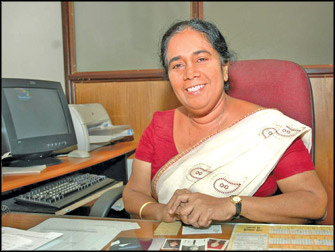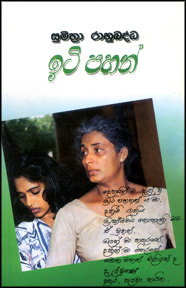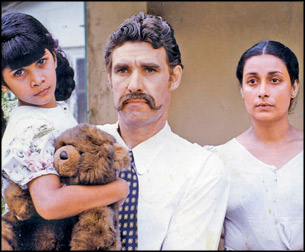|
Itipahan:
Analysis of political history through personal odyssey
By Ranga CHANDRARATHNE
 |
|
Novelist Sumithra
Rahubadde |
As a special segment of Montage, dedicated to promoting and
propagating Sinhala literature among the English readership and
introducing Sinhala literature to an international audience, Sunday
Observer serialises the English translation of the celebrated Sinhala
novel 'Itipahan' by veteran Sinhalese novelist Sumithra Rahubadde. More
than ten editions of Itipahan have been published and it was also
converted into a teledrama.
The English translation will be serialised in Montage from next week.
Following is the critical analysis of the novel.
Since the novel covers the political landscape of Sri Lanka from
1947, the year prior to Sri Lanka gained independence from Britain, to
1987, the year which was marred by violent uprising of radical leftist
political party, the masterly narration of the story revolves around the
lead character Some or Suzan Daisy, is not a mere literary exercise of
the highly sensitive author.
In fact, the crux of the plot is woven around the tragic real life
tale of a girl who is a victim of the circumstances; her birth takes
place at the tail end of British colonialism in Sri Lanka, she grows up
amidst hardships in a rural hamlet fortified by its intransigent
socio-cultural norms with a highly patriarchic social order and she
spends her teens and adolescent against a turbulent political atmosphere
where she tries hard to reconcile with her indomitable quest for upward
social mobility with a strong class consciousness against her will to
liberate the men and women of the same circumstances.
Itipahan owes its imminence popularity over the years, by and
largely, to its brilliant portrayal of the volcanic tremors in the Sri
Lankan political landscape from a perspective of a girl who refuses to
yield unto the pressures mounted upon her by the socio-cultural norms of
the milieu. The village community with its archetype beliefs condemns
the lone mother and the girl whilst attempting to sexually abuse and
exploits them.
"Oh, I could not give the child a comfortable life" said Some's
mother when Some's journalist friend broke out the tragic death of her
daughter following a vehicular accident. She (mother) sheds no tears.
Itipahan is based on a tragic life story of a girl who was born as an
illegitimate daughter of a British Government Agent to a servant woman
who worked at the formers bungalow. Although this type of illegitimate
children was a common phenomenon under the shadow of colonialism, the
difference in this particular case is that the Government Agent seeks
permission from the British Government to legitimise the affair.
However, the British Government turns it down calling back the
officer to Britain. Some's mother refuses to give her to the officer to
be raised in Britain and goes along with the child back to the village
to face a hard life. When the British left the shores of Sri Lanka, they
bequeath a system of education which was primarily designed to
perpetuate colonialism. Along with this system of education emerged a
privileged class which quickly replaced British bureaucracy and English
officials who stayed in Sri Lanka until 1952-1953 as if to hand over the
baton to the native brown sahibs who clad tail courts and wore ties.
 As the theme of the novel, author wanted to depict the political
upheavals from 1947 to 1987 as the lead character of the novel is
actively involved in these upheavals. In fact, she (Some) represents all
these turmoil. She was born, as soon as Sri Lanka gained independence, a
daughter of Sri Lankan woman from an underprivileged background and an
illegitimate child of a British Government Agent. So, by birth, she
marks a watershed in Sri Lankan political history. As the theme of the novel, author wanted to depict the political
upheavals from 1947 to 1987 as the lead character of the novel is
actively involved in these upheavals. In fact, she (Some) represents all
these turmoil. She was born, as soon as Sri Lanka gained independence, a
daughter of Sri Lankan woman from an underprivileged background and an
illegitimate child of a British Government Agent. So, by birth, she
marks a watershed in Sri Lankan political history.
Her British Government Agent father has to leave the island following
his attempts to legalise the marriage. If the father does not want to
legalise the affair, he could have stayed in Sri Lanka. Thereafter,
Some's mother has to return to the village with the child. She has to
face the full brunt of social stigma attached to a mother of an
illegitimate child. However, Some, the child, refuses to yield unto the
social stigma; from childhood Some bears identical traits. For instance,
Some comes to the village as a girl who speaks fluent English which is
also subjected to ridicule in the village. Subsequently her fluency in
English vanishes off. Dulina (Some's mother), now, is a domestic aid in
a manor-house. Dulina, somehow, schools Some knowing well that Some is a
daughter of a British Government Agent and that if she had allowed him
to take the custody of the child, she could have been raised in a
different social condition. So Dulina tries to educate the child.
Sirinatha and his sister Sriyadari are members of the aristocratic
family in the manor-house where Dulina works as a domestic aid.
Sriyadari is fond of Some, however, that fondness has its own
limitations. Sirinatha harbours strong attraction towards Some. Although
Some's real name is Daisy Suzan, she has been given the name of Some
when villagers scorned at it. Some opposes the change. Subsequently, she
becomes Some. Sirinatha commences a liaison with Some. However, it is
not clear whether this is a love for Sirinatha though Some is sincere
about the relationship. It is a kind of platonic love. Sirinatha leaves
for Colombo for employment and Some makes up her mind to follow
Sirinatha knowing well that her mother Dulina is not respected in the
village and she also could not command any respect from the community if
she does not educate herself. By 1965, village is engulfing in a kind of
a fever in the run to the election. Village Council member exploits
Some's talents as she is a powerful orator. Some campaigns for a certain
candidate representing a major political party. The village community
severely criticises the move. In her heart, Some has the uncompromising
urge to prove her metal and to be in the lime light irrespective of the
nature of the opportunities she comes across.
Meanwhile, Dulina and Some face an issue as they live alone in the
village.
Although villagers look down on them, they also strive to sexually
abuse them. Dulina fights hard against this tendency. However,
Kumatheris who is married and the brother of Dulina's ex-husband
sexually abuses her by force.
Towards the end of 1965, Some enters the university having passed the
competitive examination. As she wants to be in the lime light, she
studies hard and always scores higher marks at tutorial classes, she
joins the radical Marxist students' movement which is affiliated to a
political party, in the university. Soon she becomes a prominent leader
in the movement and also involved in its armed rebellion in 1970s. By
the time, she firmly believes in the ideology of the movement. She
sometimes utters, "I can salvage myself from this mess but what is the
use of it while thousands of others trapped in this ". The 1970's
rebellion which is also a turning point in the political history of Sri
Lanka is also a turning point in Some's life. She is captured by the
army and imprisons her along with thousands of cadres of the movement.
By 1986, when the radical movement stages its second abortive
rebellion, Some has been thoroughly disenchanted with the sincerity and
objectives of the movement. As the Government violently cracks down the
rebellion, the members of the high command of the movement flee the
country in search of greener pastures while ordinary members perish at
the hand of the army. She questions this stance on the part of the
leaders of the movement.
"You would flee the country. Where are we and our children to escape
to? "questions Some a prominent member of the movement who flees the
country.
Some then joins a women's right movement. Whilst in prison, a soldier
wins her heart and marries her when she is released from the prison.
Although the soldier creates a secure environment for Some and
mother, Some's strong personality clashes with that of the soldier's. As
this clash of personalities becomes unbearable at an instance, Some
says," Give me your uniform for a day". What Some wants in the marriage
to the soldier is to infiltrate the army on behalf of the movement. To a
certain extent, she has also been succeeded in the mission. However,
owing to a family crisis, Some's soldier husband commits suicide by
swallowing acid.
 |
|
A scene from the
teledrama Itipahan |
Following the death of her husband, Some meets up with Sirinatha who
is, by now, a well-established person in the high society. At first,
Sirinatha is shocked in meeting with Some. Some takes his spectacles off
questioning him whether he is shortsighted. During the ensuing
conversation, Sirinatha expresses his regret over the death of Some's
husband. Some replies, "Death of my husband is a burden off my
soldiers". Then Sirinatha tells Some, "Do not ever utter this again".
This shows Some's honesty and Sirinatha's hypocritical nature.
Thereafter, Some commences a relationship with a politically
conscious journalist who is a disgruntle character heavily involved in
the LSSP and the Communist party. In the latter part of her life, the
only man who closely associates with Some is this journalist. While
continuing with the relationship with the journalist.
A significant aspect of the novel is the narration of the political
history of Sri Lanka from 1947 to 1987 as a sub-text of Some's life
story. Although the entire novel is not based on a true story, the story
of lead role Some is based on a true story of a girl who is illegitimate
daughter of a British Government Agent and a poor servant woman from an
impoverish village.
"Before I wrote the novel I intensively studied the socio-cultural
background as well as men and women associated with Some. I basically
got the information from her lover. However, Some's lover wanted me to
write a different story.
What I did was to put myself in Some's shoes and narrated the story
from Some's perspective."said the author.
The novel will be translated by Ranga Chandrarathne and edited by
Indeewara Thilakarathne.
|

